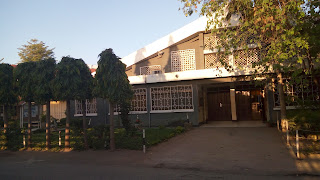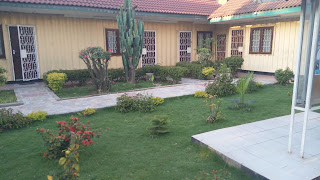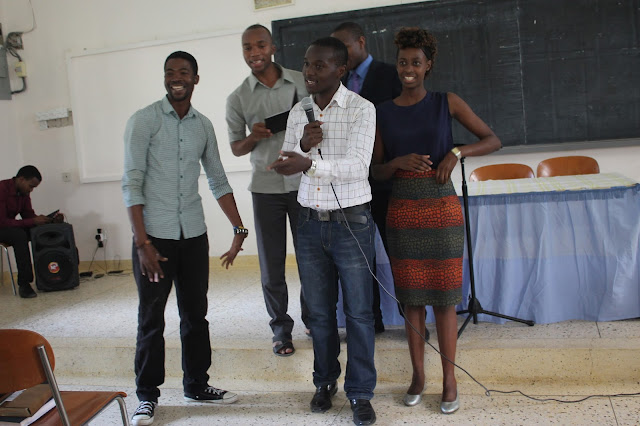 |
| Pope Francis greets the Faithful who attend the Holy Mass and canonization of Mother Teresa of Calcutta, in Saint Peter's square at the Vatican, on Sept, 4, 2016. |
Pope Francis declared Mother Teresa a saint on Sunday 4TH SEPT,2016, telling crowds
in St. Peter’s Square that the Albanian-born nun’s decades of toil in
the slums of Calcutta made her a “
model of holiness.”
“
She bowed
down before those who were spent, left to die on the side of the road,
seeing in them their God-given dignity,” the pope said at
the canonization ceremony for the nun, who died in 1997 at the age of
87, and was put on an unusually swift track toward sainthood just six
years later.
Amid the crowd of 120,000 in the square for the ceremony were
13 heads of state, including Queen Sofia of Spain. Hundreds of nuns from
Mother Teresa’s religious order, the Missionaries of Charity, were
there, wearing their trademark blue-trimmed saris. 1,500 homeless people
were also brought to St. Peter’s for the event, and treated to lunch
afterwards.
In his homily, Francis focused on Mother Teresa’s
efforts to help those living on the edge of society, a theme the pope
has made central to his papacy.
“
Her mission to the urban and existential peripheries
remains for us today an eloquent witness to God’s closeness to the
poorest of the poor,” he said. “Today, I pass on this emblematic figure
of womanhood and of consecrated life to the whole world of volunteers:
May she be your model of holiness!”
Born Agnes Gonxha Bojaxhiu in
1910 to an Albanian family in Skopje, then part of the Ottoman Empire,
and now Macedonia, Mother Teresa became a nun in Ireland before founding
her own order in India in 1946, which became the Missionaries of
Charity and built a global empire of orphanages and shelters.
She
received the Nobel peace prize in 1979, but was also attacked for the
sanitary conditions in her clinics and her opposition to
family planning.
Francis
put a different gloss on that Sunday, saying that Mother Teresa had
“made her voice heard before the powers of this world, so that
they might recognize their guilt for the crime of poverty they created.”
And
he strongly backed her opposition to abortion — a part of the Roman
Catholic church’s teaching — saying that she “
was committed to defending
life, ceaselessly proclaiming that 'the unborn are the weakest, the
smallest, the most vulnerable.'”
Faithful attend the Holy Mass and canonization of Mother Teresa of
Kolkata, in Saint Peter’s square at the Vatican, on Sept. 4, 2016.
The ceremony came as a climax to a Holy Year of Mercy that
the Pope has proclaimed, in which he has stressed the primacy of mercy
over Catholic dogma.
In his homily he portrayed Mother Teresa as a role model.
“
For
Mother Teresa, mercy was the salt which gave flavor to her work, it was
the light which shone in the darkness of the many who no longer had
tears to shed for their poverty and suffering,” he said.
“
May this
tireless worker of mercy help us to increasingly understand that our
only criterion for action is gratuitous love, free from every ideology
and all obligations, offered freely to everyone without distinction of
language, culture, race or religion,” he added.
The nun will
henceforth be officially named St. Teresa of Calcutta, although in his
homily, Pope Francis said he expected her to continue to be called
Mother Teresa.
Attendance for Sunday’s ceremony was far below the
300,000 who turned out at St. Peter’s in 2003 for Mother Teresa’s
beatification — an earlier stage in the process toward sainthood. Fears
over the possibility of a terrorist attack may have deterred some from
taking part. Some 3,000 police were on hand to provide security for
Sunday’s event.
High temperatures failed to dampen the party
spirit in the colonnaded square. Pilgrims held flags and cheered loudly
as Francis circled around after the ceremony, waving from his
pope mobile. Missionaries of Charity sisters excitedly escorted the
homeless through the gates of the Vatican, where chefs dispensed
fresh-baked pizzas from three ovens brought in for the occasion.
Muslims, Hindus and Catholics were among those present, including Albanians and a large Indian contingent.
“She
was a living saint,” said Vincy Mathew, 40, who grew up in Kerala,
India, before moving to Italy to work as a nurse 10 years ago.
“She loved poor people without distinction — she is an Indian hero,” she said.
Donning
sunglasses against the sweltering sun in St Peter’s Square, Albana
Krasniqi, 44, said it was “amazing” to be present for the canonization.
“Saints
don’t get made every day,” said the Albanian-born Krasniqi, who left
war-torn Kosovo in 1995 and now works as a financial analyst in New
York.
“Albanians cherished Mother Teresa, and my family has talked
about her since I can remember,” said Krasniqi, who traveled to Rome
for the canonization. “She was just part of the conversation.”
Krasniqi
now volunteers with a charity to help bring 1,500 children with heart
conditions to the U.S. from around the world every year for operations.
“Mother Teresa showed us it doesn’t matter where you come from. If you have love in your heart, you can do miracles,” she said.
Avni
Dervishi, 43, draped a flag over a barrier to promote the status of
Kosovo, the Balkan region with a large Albanian community where Mother
Teresa spent time when she was young, and which has been recognized as
an independent state by more than 100 countries, but not the Vatican.
“My mother told me the best religion was helping people, and Mother Teresa was a symbol of that,” said Dervishi.
Touching his flag, he added, “We [have] given the Vatican a saint, now I [am] hoping they will recognize Kosovo.”
At
the Mother House of the Missionaries of Charity in Kolkata, as the city
is now known, hundreds of people watching the Mass on television
clapped with joy when Francis made the declaration of sainthood. They
gathered around Mother Teresa's tomb, which was decorated with flowers, a
single candle and a photo of the tiny saint.
“I am so proud to
be from Kolkata,” said Sanjay Sarkar, a high school student on hand for
the celebration. “Mother Teresa belonged to Kolkata, and she has been
declared a saint.”

























































































































